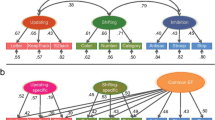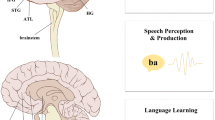
Overview
- Provides a critical and objective analysis of important issues related to the influence of bilingualism on cognitive control
- Includes in-depth coverage from important disciplines such psycholinguistics, cognitive psychology and cognitive neuroscience
- Present and reviews data from both linguistic and non-linguistic domains
Part of the book series: The Bilingual Mind and Brain Book Series (BMBBS, volume 6)
Access this book
Tax calculation will be finalised at checkout
Other ways to access
About this book
This thought-provoking monograph makes a multidisciplinary case for bilingualism as a possible enhancer of executive function, particularly cognitive control. Its central focus is the cognitive operations of the bilingual brain in processing two languages and whether they afford the brain a greater edge on neuroplasticity—in short, a cognitive advantage. Major issues and controversies in the debate are analyzed from cognitive neuroscience, psycholinguistic, and integrative perspectives, with attention paid to commonly and rarely studied domains at work in bilingual processing. The author also pinpoints future areas for improved research such as recognizing the diversity of bilingualism, not simply in languages spoken but also in social context, as seen among immigrants and refugees.
Included in the coverage:
- The evolution of bilingualism.
- What goes on in a bilingual mind? The core cognitive mechanisms.
- Cognitive advantage ofbilingualism and its criticisms.
- Neuroscience of bilingualism.
- Bilingualism, context, and control.
- Attention, vision, and control in bilinguals.
With its cogent takes on ongoing questions and emerging issues, Bilingualism and Cognitive Control is of immediate interest to bilingual researchers and practitioners interested in understanding the behavioral aspects and neurobiology of bilingualism and the dynamic character of the bilingual/multilingual/second language learner’s mind, as well as the growing number of advanced undergraduate and graduate students interested in the psychology/psycholinguistics of bilingualism, bilingual cognitive psychology, cognitive science, and cognitive neuroscience.
Similar content being viewed by others
Keywords
- attentional control
- spatial memory
- bilingual executive control
- inhibitory control model
- bilingual cognitive advantages
- brain plasticity
- working memory
- semantic memory
- bilingual language control
- evolution of bilingualism
- linguistic interface in bilinguals
- preventing cognitive decline
- visual search tasks
- cognitive psychology and inhibition
Table of contents (8 chapters)
-
Front Matter
-
Back Matter
Authors and Affiliations
About the author
Ramesh Kumar Mishra is a cognitive scientist and chair of the Center for Neural and Cognitive Sciences, University of Hyderabad, a major research university of India. He has published widely in the areas of attention, visual processing, bilingualism and language processing. He has also published on literacy and its influence on cognition. He has edited or authored three books (Mishra, 2015; Mishra, Huettig, & Srinivasan, 2015; Mishra & Srinivasan, 2011) so far in the area of language-vision interaction. He is also an editorial board member of Bilingualism: Language and Cognition. His dual expertise in cognitive psychology (attention, vision and executive control) and psycholinguistics of bilingualism (language non-selective activation, visual world eye tracking) helps him to explore in-depth the cognitive science angle to the bilingual advantage effect. He is the Editor-in-Chief of the International Journal of Cultural Cognitive Science (Springer) and is a fellow of the Psychonomic Society.
Bibliographic Information
Book Title: Bilingualism and Cognitive Control
Authors: Ramesh Kumar Mishra
Series Title: The Bilingual Mind and Brain Book Series
DOI: https://doi.org/10.1007/978-3-319-92513-4
Publisher: Springer Cham
eBook Packages: Behavioral Science and Psychology, Behavioral Science and Psychology (R0)
Copyright Information: Springer International Publishing AG, part of Springer Nature 2018
Hardcover ISBN: 978-3-319-92512-7Published: 31 July 2018
Softcover ISBN: 978-3-030-06449-5Published: 21 December 2018
eBook ISBN: 978-3-319-92513-4Published: 20 July 2018
Series ISSN: 2945-5952
Series E-ISSN: 2945-5960
Edition Number: 1
Number of Pages: XIII, 185
Number of Illustrations: 6 b/w illustrations, 24 illustrations in colour
Topics: Cognitive Psychology, Cognitive Linguistics, Multilingualism



